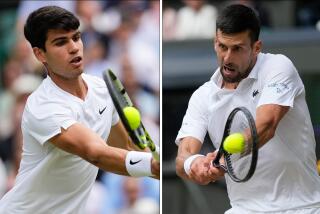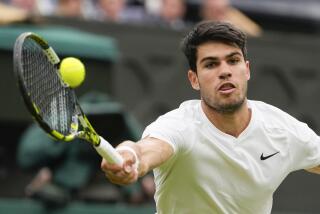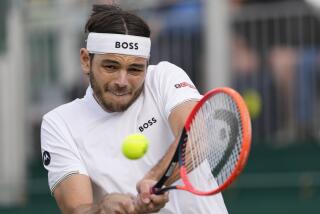Becker’s Victory Puts a New Face in the Spotlight
- Share via
WIMBLEDON, England — The Wimbledon men’s final produced a new name and a new face Sunday in a sport that desperately needs both.
And picture this face: befreckled, smudged with dirt, mischievous eyes, a mouth given to sly grins. This face belongs on an Iowa farm, or on a Wheaties box. Mary Lou, take note.
This face belongs to Boris (Amadeus) Becker, tennis prodigy. You’d do well to remember the name.
The 17-year-old baby boomer, your latest phenom, walked all over the Wimbledon history books Sunday, in much the way he walked over Kevin Curren, your recent humbler of champions.
Young girls breathlessly called his name as Becker, dauntless in his youth, was too strong and too cool for Curren, beating him in four sets, 6-3, 6-7, 7-6, 6-4, to win the men’s singles.
It was a roll in the grass for Becker, who did, more than occasionally, roll on what was left of the grass on Centre Court, playing the points much as Pete Rose might.
“I should have had the advantage,” Curren said. “I’ve been to the semifinals here before. I’ve been on Centre Court. Maybe he was too young to understand.”
He was too young, by any reasonable accounting. Becker is the youngest to ever win the men’s singles in 99 years of Wimbledon, two years younger than Wilfred Baddeley, the champion in 1891.
Becker also became the first unseeded player to win here. Eight others had made it to the final before, but none of those eight had ever won so much as a set.
What makes Becker so special?
Well, you can begin with his serve and the 21 aces he flew past Curren, the one-time king of aces, kicking up Centre Court dust. You can credit his mobility, which enables him to hit a winner from anywhere on the court. Or you can, as Curren did, talk of inner qualities.
“He has the quality of a champion,” Curren said.
Curren knows something of champions. He beat John McEnroe on Thursday, he beat Jimmy Connors on Friday, but he couldn’t handle Becker on Sunday.
Ion Tiriac, the man who does handle Becker, says he, like the rest of the world, is still learning what Becker might do.
“It looks like every time he is under stress or in a difficult position, he--if it’s not magic--somehow lifts himself to a higher level,” Tiriac said.
Maybe it is magic. Maybe Boris escaped from the laboratory.
For sure, we have not often seen his like. There have been only four winners of the last 10 Wimbledons, the others being McEnroe, Connors and Bjorn Borg.
Becker took no time getting into the match, holding his first serve while losing only one point. So much for nerves.
Curren, meantime, lost his first serve and looked like a man in danger of losing his head. Coming into the match, he had not been broken in 44 service games.
“I played a horrific game at the start,” Curren said. “It was just a case of too much eagerness. I made some unforced errors, and that set me off on the wrong path.”
Eventually, Curren pulled himself together, but never completely. Becker pressured and pressured, and it was Curren who cracked.
Both players, of course, have the big serve. Curren contributed 19 aces to a game that sometimes barely resembled traditional tennis. Even on a surface that favors the serve and volley, Becker and Curren carried the concept to an extreme. The Dodgers have longer rallies than these guys.
Despite the typical flurry of aces, Curren was well off his game. Against Connors and McEnroe, he was scoring on nearly 70% of his first serves. Against Becker, Curren served 46%. That was the ball game.
Becker won the first set with the service break. Neither player was able to break in the second, and Curren, in his finest moment, won the tiebreaker, the last point coming on a fine backhand passing shot.
Briefly taking charge in the third set, Curren broke Becker to lead 4-3, the chalk flying on the base line as Curren’s passing shot landed just in. Becker slumped only briefly.
Curren lost the first three points on his serve, twice getting passed on brilliant shots by Becker, who broke him with one more.
It was at that point that the world saw the real Boris Becker, the one who may challenge McEnroe.
Seizing the moment, Becker clenched both fists and broke into dance, a little step that would have done Billy (White Shoes) Johnson proud. Becker will dance on the court, he’ll stare across the net, he’ll swipe the ground with his racket, he’ll try to intimidate.
But what he did mostly Sunday, and what he has done in winning his last two tournaments and last 13 matches, is win the big points, often flying through the air to do so.
“When I broke him back, that was the point that I thought I was going to win,” Becker said. “I was playing well, and maybe I had a little more confidence than he did.”
It came to another tiebreaker, and Becker won the first six points on the way to the set. On that winner, he punched the air.
The last set was routine, if filled with flying aces and flying dust. After two weeks of play, Centre Court had turned into a dust bowl. It was the kind of place Tom Joad piled his family into a pickup truck to get away from.
“It was like a mixture of the French Open (played on clay) and Wimbledon,” Becker said. “In the middle of the court, it was the French Open. On the outsides, it was Wimbledon.”
Becker talks pretty well for a high school dropout from Leimen, especially in a second tongue. Nothing seems to rattle him. A few bad bounces on the Wimbledon dirt seemed to annoy him, but never unnerve him. In any case, he likes dirt, and his playing whites were playing browns midway into the match.
Again, it was Curren who seemed to suffer from nerves. He lost his first serve in the fourth set, immediately following the tiebreaker defeat. On two of his next three serves, he struggled mightily. Boris simply rolled.
Only at the end, a point away from the ultimate, did the moment grow too great for young Boris. He served an ace to go up, 40-15, but then double faulted.
His next serve streaked by Curren, who barely got graphite on it.
Becker looked to the sky. Then he looked to where his parents, Karl-Heinz and Elvira Becker, were sitting. He had two hands in the sky.
Tiriac, his manager, had one to his face, as if in disbelief.
“To be honest, I don’t realize what he’s done, and I don’t think he realizes it,” Tiriac said.
The Duke of Kent gave him the cup, and the All England Club will give him the money, around $170,000. But how can he understand it?
A year ago, just 16, Becker won his first two matches here and then had to be carried off the court during his third-round match after tearing a tendon below one knee.
If he were not 17, you might characterize that as a comeback. At 17, it’s more like a miracle. Certainly, it’s unprecedented.
“He can be the No. 1 player in the world,” Curren said. “But he’s only 17 and he’s got a lot of time and lot of room for improvement.
“I think if he had to play McEnroe on a regular basis at this stage, he’d have no chance.”
Becker was fortunate in that he was not forced to play any of the top four seeded players at Wimbledon. But the rest of the fortune he made on his own.
Three times, he lost his first set. Three times, rain delayed his matches for a day.
None of it seemed to matter. And now Becker can go home a hero, the new kid in town.
“I think this is going to change tennis in Germany,” Becker said. “In Germany, we never had an idol. Maybe now we have one.”
Maybe now, for sure.
More to Read
Go beyond the scoreboard
Get the latest on L.A.'s teams in the daily Sports Report newsletter.
You may occasionally receive promotional content from the Los Angeles Times.










